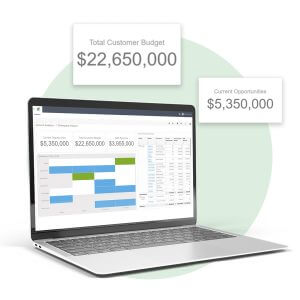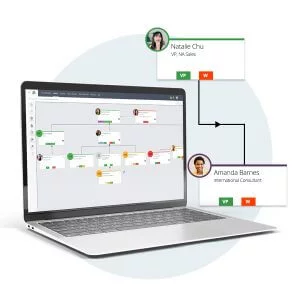Your strategic account planning process is integral to optimizing revenue in your largest accounts. In an interview we conducted with Forresters’ Vice President and Principal Analyst of Sales Operations Strategies, Robert Muñoz, he shared the critical ingredients of effective account plans and how to drive results through living account plans.
What is Strategic Account Planning?
Before we dive into account planning best practices, let’s all get on the same page about account planning definition. Muñoz defines account planning as:
- A structured, repeatable methodology for analyzing an account or set of assigned accounts, developing a deeper understanding of them, and identifying opportunities
- A success plan for the sales rep that aligns their assigned account(s), their quota, and their commission plan
- A process by which plans are developed, reviewed, and updated regularly
To elaborate, customer accounts are typically intricate, and conventional sales methods often simplify them by grouping customers based on shared traits such as industry, staff size, sales volume, and other data points. This approach may help businesses understand their clients better, but it can cause sales reps to overlook important details that could lead to greater revenue from the same account.
Account planning addresses this issue by encouraging salespeople to delve into each customer’s unique needs, motivations, and business circumstances. With a deeper understanding of their customers, sales managers can identify new ways to increase revenue from existing accounts. For example, being aware of recent changes within a client’s organization, such as office expansion or new funding, can help sales reps
present proposals that are more likely to be accepted. By considering their clients’ challenges and opportunities, businesses can offer solutions that benefit all parties involved.
The Key Issues with Strategic Account Planning
Many sales organizations stray away from this definition when operationalizing their account plans. Even though many sales organizations invest in account planning strategy, methodologies, and templates, they fail to operationalize the program so they can measure and sustain the planning program’s success.
Long-term value requires coordination and collaboration between sales, marketing, and all other relevant channels, yet, it takes a backseat to short-term objectives, resulting in a lack of coordinated plans for sustained retention and growth.
High-performing companies leverage the following 8 strategic account planning components to be more effective.
8 Elements to Elevate Your Strategic Account Planning
1. Organizational alignment
Organization alignment is one of the critical ingredients of a successful strategic account plan. You must have a commitment to an account planning ecosystem with executive engagement and collaboration, cooperation, and communication with marketing, channels, partners, and other functional groups. Consistent, measurable business goals must be shared between functions to drive account acquisition, growth, and retention.
2. Planning methodology
It’s critical to have a repeatable set of role-based methodologies, with multiple learning modalities and a change management process.
Methodologies can be internally developed or leverage 3rd party resources. There are multiple plan types based on sales roles, and they should be tailored to suit your business model. A few of the multiple learning modalities can include written guides, workbooks, eLearning, workshops or coaching.
3. Planning Components
The minimum set of plan components to result in an executable plan. Plan components will vary by plan type but most all would include relationship and strategy maps, action plans, and scorecards.
4. Planning Process
This is the process of creating, reviewing, and approving the account plan. It is important to have a defined purpose, key participants, and a known outcome for each step.
5. Sales Management Process
It’s important to integrate the planning process into quarterly reviews and updates. First-line managers must be enabled to review and coach on the quality of account plans and the execution of the action plan.
6. Metrics and Reporting
Clearly defined measures and reporting cadence are a must. You need to be able to track results in terms of short-term activity, mid-term pipeline growth, and long-term revenue growth by adapting core sales metrics to the program.
7. Infrastructure
Account plans should be integrated into a CRM. This allows sales teams to minimize double data entry and have a single instance for all global account activity. Account team members are then able to view and update common account information across regional or organizational boundaries. Further, executive and management dashboards and reports include global account metrics, providing a holistic view of the account. This allows sales teams to reinforce the methodology.
8. Implement and Sustain
Sales teams should leverage technology to enable the program to be part of the daily workflow of the rep and manager with highlighted metrics (i.e. value drivers, health indicators, and risk markers)
The Pros and Cons of Strategic Account Planning
Strategic account planning is considered one of the most effective strategies for businesses to increase revenue and maintain current sales. This approach offers two significant benefits:

Retain your customers: it offers a more effective way to retain clients and secure contract renewals. Strategic account management helps to preserve customer relationships by prioritizing personalized offers, reinforcing value delivered, and proposing mutually beneficial solutions, which can significantly reduce churn rates.
Account management planning is a proactive approach that can help generate additional sales from existing customers while retaining valuable clients.
Naturally, strategic account planning has its downsides, which may include the following:
Intensive process: It requires additional resources to gather a comprehensive understanding of buyer needs, competitive pressures, and other information. This involves ongoing research and regular relationship building, which may limit the team’s ability to focus on prospecting and pitching to new customers.
Costly: The overall costs of account planning could outweigh the revenue generated or preserved. This is because companies may end up spending more resources on targeting existing buyers than they would on acquiring new clients. Therefore, it is crucial for business owners to streamline the execution of the process and prioritize accounts based on their potential for generating the most significant revenue with the highest chances of success.
Undoubtedly, businesses may face some risks when implementing strategic account planning. However, they can mitigate these risks by directing their sales team to focus on accounts that have the highest potential to close new deals through personalized cross-selling and upselling, which can help offset the investment of resources and time.
Technology to Operationalize Strategic Account Plans
It’s critical to use purpose-built technology that enables efficient, integrated, and strategic account planning execution and collaboration. This will allow you to actually optimize your strategic account planning process and maximize results.
The Revegy Strategic Account Planning Solution
To successfully execute and collaborate on strategic account planning, it is essential to utilize purpose-built technology that facilitates efficient and integrated processes.With Revegy, users can create dynamic account plans that adapt to changing customer needs, evolving relationships, and unexpected events. The platform facilitates collaboration across teams and ensures that everyone is on the same page, aligning the company’s efforts to achieve common goals.
Moreover, Revegy provides a centralized view of all key accounts, which enables sales representatives to quickly and easily understand the current status and what needs to be done to achieve success. The platform also helps identify opportunities for growth and expansion, streamlining the process of cross-selling and upselling to existing customers. Ultimately, Revegy enables businesses to develop and implement effective account plans that drive revenue growth and improve customer retention.
The Value of the Revegy Platform
Here are some of the main features of the Revegy platform:
Account Potential: One of the most significant benefits of the platform is the ability to see account potential. With a holistic view of the customer’s goals and objectives, you can uncover unmet needs in existing accounts and determine where you can add additional value and expand your presence.
Identify Key Stakeholders: Another valuable feature of the platform is the ability to identify key stakeholders. Mitigate risk by using Revegy’s visual guide to understanding critical relationships. Pinpoint influencers, uncover blind spots, discover how to leverage existing relationships, and expand your footprint.
Account Health Visibility: You’ll also gain visibility into account health, allowing you to coach your team to mitigate the risk of churn and accelerate their identification of expansion opportunities. The platform 
Achieve Consistency: By providing key account managers with playbooks for building strategies that optimize effectiveness and drive collaboration, our platform also enables you to achieve better consistency. With the platform’s user-friendly interface, you can easily create, manage, and update account plans tailored to your unique business needs.
Improve Forecast Accuracy: By orchestrating a scalable, repeatable, collaborative process in a single pane of glass, the platform provides the tools, data, and access you need to achieve predictable revenue growth.
Don’t settle for outdated and inefficient methods of managing your sales accounts. Switch to Revegy’s account planning platform and achieve consistency, improve forecast accuracy, and uncover new opportunities for growth and expansion.
Request a Demo
Now On Demand!
“Sales on the Move: Embracing Agility for a Changing Sales Journey.”
Watch our on-demand webinar, where we delve into the key elements of an agile sales approach from start to finish, featuring Luiz Martins, CMO of Revegy, along with esteemed guest speakers Donald C Kelly, Founder and The Sales Evangelist, and Doug Inda, SVP of Enterprise Client Development at Syndigo. Discover how to adapt to tighter budgets without compromising sales performance, leverage technology to streamline processes and close more deals, provide meaningful value to buyers amidst abundant data, succeed in a remote sales environment with effective communication and virtual presentations, and position yourself as a trusted advisor in today’s ever-changing sales landscape. This is your chance to increase your pipeline and propel your success forward. Watch on-demand here!








